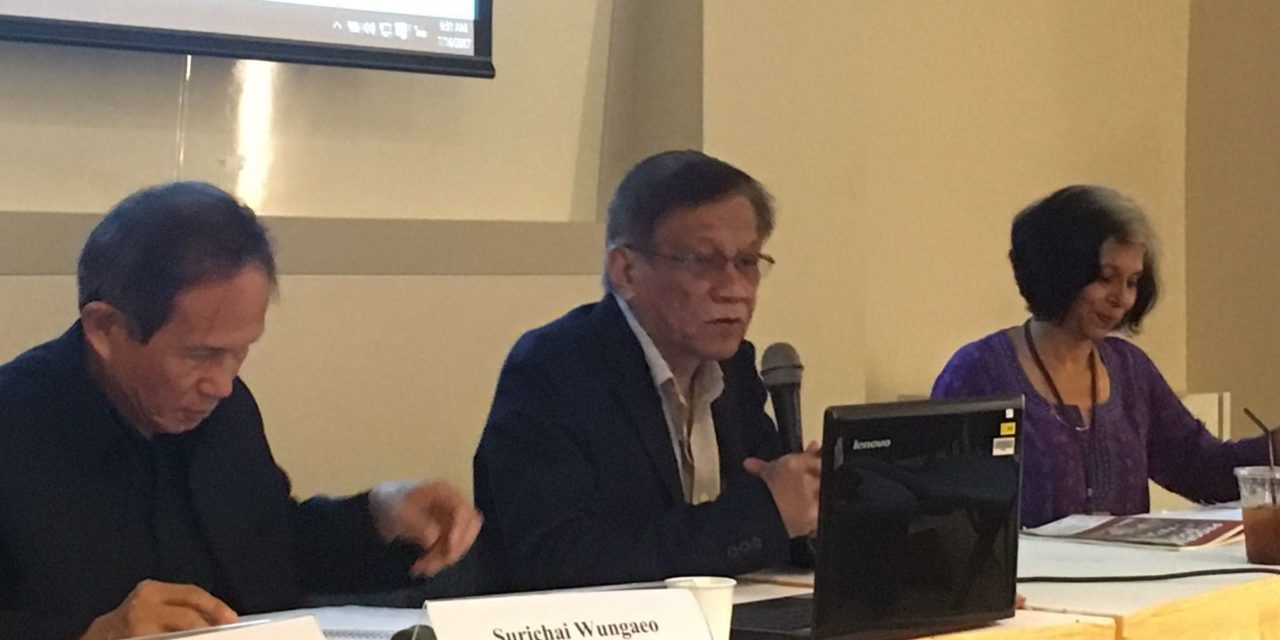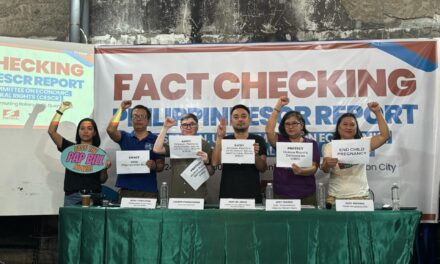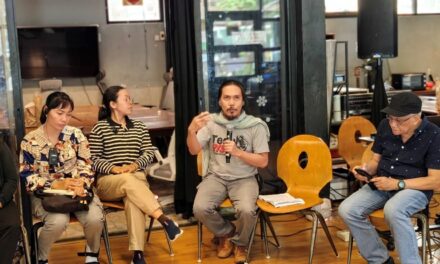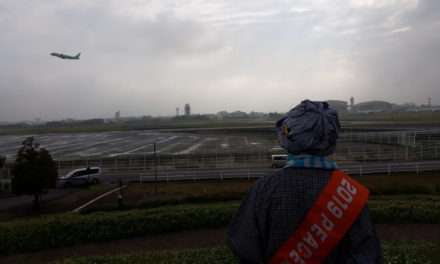Shalmali Guttal, Executive Director of Focus and moderator of the event, opened up the roundtable by giving a regional overview of the current context in Asia. She described the significant emphasis that Asian governments place on economic growth, and particularly the prioritization of large-scale investment by state and corporate enterprises- much of it transboundary- through policies, laws and regulations that favour agribusiness, special economic zones, energy projects, resource extraction, and other industry and infrastructure.
Despite the rapid economic growth experienced by countries in the region, the poor have benefited very little. Instead, the e economic model adopted by Asian governments has deepened inequalities and structural imbalances. Local communities are being systematically dispossessed from their land and livelihoods, while distress migration and labour trafficking are on the rise. These trends have resulted in a redistribution of wealth from the poor and vulnerable to the rich and elites. New trade and investment agreements further reinforce and systematize such inequalities of wealth, privilege and rights.
Guttal said that the deepening of capitalism and neoliberalism in Asia has been accompanied by a new force of extreme authoritarianism and dictatorial regimes. These regimes are either popularly elected, and/or enjoy the support of people from different classes, enabling them to remain in power. Modi in India, Duterte in the Philippines, the military dictatorship in Thailand, Hun Sen in Cambodia, and the governments of Laos and Vietnam are all such examples. While the characteristics and historical conditions of each of these regimes may differ, they do share commonalities. One common feature is scepticism of liberal democracy where all citizens enjoy equal rights regardless of class, race, caste or gender; the other is the complete dedication and perpetuation of capitalism where the few who control wealth and wealth creation, make the important economic decisions that affect the majority.
Walden Bello took the discussion to national level by examining the rise and popularity of Rodrigo Duterte in the Philippines. It has been just over 12 months since Duterte was popularly elected as President. This has been a year of indiscriminate killing of drug users and pushers. The murder toll of Duterte’s war on drugs has reached over 7,000, but others put the figure at over 10,000 people. Bello reminded the audience that this is a result of democratic processes and warned, “when democracy screws up big time, the consequences can be incalculable and less predictable than the usual military take-over.”
Despite Duterte’s extreme methods, he still enjoys widespread popularity and support from across society, and particularly the upper and middle classes. Duterte astutely spotted an opportunity to gain support: by campaigning on an anti-crime agenda. Despite his singular focus on crime and drugs, people believe that Duterte will use his “iron hand” in solving other problems, such as corruption, government inefficiency, poverty and inequality.
Bello emphasized that Duterte’s rise cannot be understood without understanding the massive popular disenchantment with the liberal democratic system that reigned in the 30-year period between the overthrow of Marcos in 1986 and the elections of 2016. It presented a fatal mix of continuing inequality, neoliberalism, and elite control of political process.
Bello called Duterte a “fascist original”: he has reversed the process by which fascists typically come to power; his style is of “blitzkrieg fascism” rather than creeping fascism; and unlike other fascist regimes, he has also been successful at bringing the traditional left into his coalition, which demonstrates that his political instincts are particularly sharp. His extremely worrying rhetoric on drug users is proving effective at justifying the killings: meth users are “the living dead”; human rights no longer apply and due process for them is a waste of time.
Opposition to Duterte remains weak: the opposition has been discredited; the catholic church is morally compromised and unpopular; and the traditional left is now part of the ruling coalition. Opposition now comes from human rights groups and new, youth-based left formations.
Bello believes that the imposition of martial law in the Mindanao region following the siege of Marawi City is the second phase of Duterte’s consolidation of dictatorship. Yet martial law may prove a double-edged sword for him, and could politicize an already demoralized army. Bello sees parallels between the Philippines and other countries in the region. The most prominent are the widespread disenchantment with liberal democracy; and related to this, the turn of the middle class towards authoritarianism or fascism. Bello pointed out that the middle class is the least studied of all classes, but that it is incredibly important to pay close attention to the behaviour of the middle class, since its volatility can lead to unpredictable outcomes.
Surichai Wungaeo followed by examining the situation in Thailand, which is caught in a cycle of military coups, authoritarianism, and short-lived democratically-elected governments. Surichai emphasized that this is not only a crisis of democracy and human rights that Thailand is experiencing, but a greater crisis of knowing and understanding Thailand as a nation. He called for greater introspection of Thai peoples’ responsibilities and personal engagement in democracy, and to take a longer-term view in understanding how to solve the crisis of democracy, both of which are inextricably tied with a crisis of identity of Thailand as a nation state. He also warned against looking at Thailand in isolation without examining its actions and influence regionally. This is important given the economic role that Thailand plays, especially in regard to its investments in the energy sector, which are causing social and environmental problems in the Mekong region, and as a destination for migrants, who end up in exploitative and dangerous work, such as in the fishing industry.
Wungaeo talked of the important role of social movements in Thailand as a means of redefining democracy from the ground. He believes we can learn a great deal from these struggles for justice and create space for genuine engagement between the local and national.
Naly Pilorge gave the final presentation, and talked of the current situation in Cambodia. She said that while most non-Cambodians remember Cambodia for the Khmer Rouge period or Angkor Wat, they have little idea of what is happening right now. Tourists see smiling faces and Starbucks cafes in a beautified Phnom Penh, but beneath this façade lies increasing violence, suffering and a population still not recovered from the upheaval of the 70s and 80s. Cambodia also has the fastest rate of deforestation in the world; is often listed as most corrupt; and is in the top-ten of most lawless countries. The garment industry has flourished in the country, with foreign countries and companies calling this “job creation”, while in fact it is more like modern enslavement.
Pilorge said that the Cambodian leadership can be described as a dictatorship, but the extreme concentration of wealth in the Hun family means that the situation is actually more convoluted. She believes that the government is a military regime masquerading as a democracy. The army is called in to quell dissent, and threaten critics. Prisons have become the main tool to address both social issues and silence the opposition. Like other countries in Asia, civil society is being squeezed, with the government seeing civil society groups as anti-government and aligned with the opposition. Pilorge believes that hope lies in the new generation of Cambodians. Over 60% of the population is under-35, and the youth are getting more exposed to new ideas by travelling more outside of the country, or accessing information online.
Pilorge showed the audience a moving video, “The Human Cost of Development in Cambodia” (available to view here) which gives voice to people directly affected by development in Cambodia. The video interviews labour leaders, community members and activists whose testimonies and experiences show us the destructive force of development in Cambodia.
Some common points and observations could be drawn from the presentations of the speakers. One is the strength of these ruling regimes; that they are able to forge consensus to exercise extreme power among different classes – from poor to elites, and particularly among the middle classes. Secondly, propaganda and rhetoric play a large role in both the rise and rule of these regimes. We can observe social media becoming a new terrain of battle, and a force for widening polarization. Dangerous rhetoric is becoming mainstream and accepted, which includes the de-humanisation of particular groups, and denunciation of groups who do not embrace the “nationalist” project as defined by the ruling regime. As a result, these groups are deemed as less deserving of full citizenship and due process by law, a view that is gaining popular buy-in. In regard to resistance struggles and hope, it is clear that the assorted social, economic and political, environmental struggles must unite in order to challenge these trends, and that the future of democracy is perhaps found in these movements. Further hope is possibly found in the youth and future generations.










